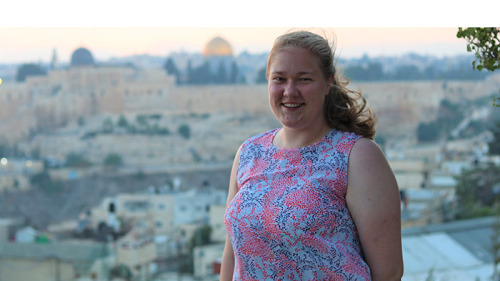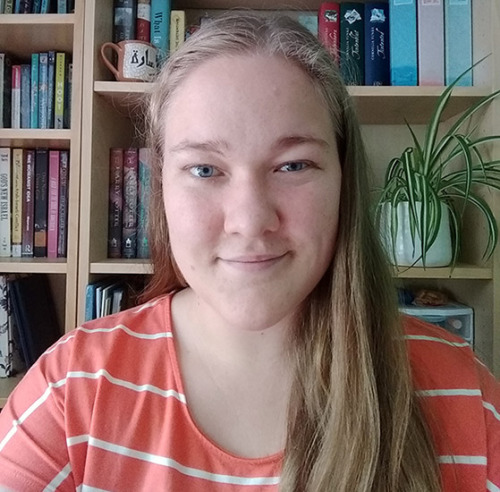
Sarah Sturm, MTS ’20
“We don’t have to have
all the answers. We don’t have to agree on everything. But even as we wrestle
with our imperfect understanding and try to learn more about other people’s
perspectives, we can still come together to act to bring about a more just and
peaceful future without having to have perfect understanding first.”
Sarah Sturm, MTS ’20, works
as the program coordinator for partnerships at Telos, a nonprofit that builds
communities of American peacemakers and equips them to help reconcile global
conflicts.
Pursuing the Deeper
Questions
My decision to attend HDS goes back to my upbringing and who I was growing up. My dad is German; my mom is American. While I spent most of my childhood in the US, we also spent significant amounts of time in Germany with my dad’s family. I always had an innate curiosity about why the two halves of my family were so different: my American grandparents are Missouri Synod Lutherans, Kansas farm kids at heart, and my dad’s parents were much more shaped by the cultures of East Germany and post-World War II communism. I wanted to try to figure out why the two halves of my family worked the way they did.
When I went to college, I told myself I was going to study economics, but I ended up studying political science and eventually became an accidental religious studies major because the religious studies department was asking the questions I wanted to ask: Why do people think and act the way they do, and how does that play out in the political sphere and in community relationships? Even after graduation, I didn’t think I was going to stay on the religious studies track: I wanted to pursue international relations, but I still held deep questions about what motivates people to act in certain ways. I became increasingly curious about how religion and political affiliation play out in the public sphere, so I began looking for graduate programs that combined religion and global politics.
At first I thought I wanted to leave the US to study, so I applied to only international schools other than HDS. When I was accepted to HDS, I still had doubts about whether divinity school was right for me, but my dad talked me into going to the admitted students’ day just to check it out. I’m so glad I did—I wouldn’t have attended HDS if I hadn’t gone to admitted students’ day to meet current students and professors.
At that time, the Religion, Conflict, Peace Initiative (RCPI) was just getting started, and I had the chance to speak with Professor Diane Moore about her vision for the program. RCPI was asking exactly the kinds of questions I wanted to explore—partly personally, partly out of academic and professional interest. I knew that if I were to study religion, I wanted to do it in a place where people were asking critical questions and bringing who they are wholeheartedly to it. And I sensed that the people at HDS were doing just that.
Orienting Towards Collective Liberation
My first semester at HDS, I enrolled in Diane Moore’s Religion, Conflict, and Peace class and began participating in RCPI events. I’ve always been interested in international politics, and as an American, I feel a responsibility for addressing the US’s role in global conflict. I was drawn to RCPI’s approach because it’s not about taking sides—instead, it stresses having a more capacious understanding of the human beings behind the conflict, and even why “conflict” is a problematic word to use. The initiative focuses on how to think and speak more critically, but in a way that is still oriented towards the impact for people on the ground.
Diane Moore’s class led me to participate in a RCPI January term course, “Learning in Context: Narratives of Displacement and Belonging,” where I travelled to Israel and the West Bank with a group of graduate students and got to know activists working on the ground. The trip left me with a deep sense of implication as an American and a desire to learn more about Israel-Palestine in an integrated way, taking not just an academic approach or an activist approach but a combination of the two.
To continue my learning, I applied for RCPI’s internship experience program as a means of moving beyond what I could learn on the page and hearing from folks on the ground who are affected directly. For my internship, I spent three months in Jerusalem working in international development, getting to know Israeli and Palestinian activists and community members. Through engaging with these activists and hearing their stories, I came back convicted that the place that I could potentially have the most impact was working in the US with fellow Americans on the role that we play in Israel-Palestine in enabling occupation to continue.
Systems of violence harm everyone who’s a part of them. RCPI has helped me figure out how I fit into these systems, where I want to make my intervention, and how I can approach my work as an aspiring peacemaker. We all have a role to play in collectively transforming the systems of violence within our communities into systems of justice and peace. This has been a central tenet for me to hold onto—that I do all of this work not only from a place of guilt or implication, but from a place of seeking mutual flourishing and recognizing that my work is oriented towards collective liberation.

Holding Space for Tricky
Conversations
Around the time that I had started thinking that where I wanted to make my intervention was with American communities, I reached out to Greg Khalil, an RCPI fellow and president of the Telos Group. Telos’s mission is to form communities of American peacemakers across lines of difference and equip them to help address seemingly intractable conflict at home and abroad. Through RCPI, I was able to do an internship with Telos while I was still a student at HDS, and once I graduated, that then turned into a part-time job and has now become a full-time job.
Telos’s main focus has been Israel-Palestine, and they work primarily with American evangelicals. As Americans, we’re implicated in Palestinian occupation. There’s a way to respond to this implication that comes from a place of guilt and shame, and there’s a way to respond to it in a way that views it as an opportunity to become peacemakers and take an active role. It’s not a question of if we’re involved, but how we’re involved. Telos means end goal, and our telos is mutual flourishing—which means that Palestinians and Israelis experience freedom, dignity, and security in equal measure.
As program coordinator for partnerships at Telos, I work primarily with our Telos Tables Program. This program is a vehicle for engaging folks who go on our Israel-Palestine trips after they return, helping them build communities where they can continue learning and then participate in collective action. So often, we might care deeply about something and want to enact change, but we don’t always know how. The Telos Tables Program helps people come together across lines of difference and actively address issues they care about to try to promote a just peace.
These kinds of conversations are really tricky to have. I don’t have them perfectly. Part of the reason I’m so committed to doing this kind of work and supporting people in having messy conversations is that other people have done that for me. My first trip to Jerusalem through RCPI was an incredibly transformative experience. I learned a lot, and I didn’t know what to do with it all. I knew I needed to keep processing it, and the RCPI community was so supportive in holding space for that continued work. It can be so easy to fall back into previously held assumptions and binaries when you don’t have a community to hold you accountable, and my peers at HDS provided that community for me. Because I’ve experienced firsthand the importance of these conversations and spaces, I want to help people figure out what these communities can look like for them after they return from their own transformative experiences.
I believe there needs to be space for people to work through some of their assumptions and challenges, and I’m grateful to get to be a part of providing that space. We don’t have to have all the answers. We don’t have to agree on everything. But even as we wrestle with our imperfect understanding and try to learn more about other people’s perspectives, we can still come together to act to bring about a more just and peaceful future without having to have perfect understanding first.
Imperfect understanding doesn’t have to be a barrier to taking action. We’re no longer allowed to say, “Well, I don’t know enough. I can’t get engaged.” We recognize that we’re involved one way or another, whether we want to be or not. Through my work with Telos, I hope to help people to react to this joyous implication, to lean into having tough conversations with their friends and families, to get active in their own communities, and to form community partnerships in the process. Without the support of a community that’s actively oriented towards peacemaking, it can be really intimidating to try to get involved on your own.
Paying It Forward
One of the things I loved about my HDS experience was having a supportive and engaged community. In my coursework and through RCPI, I got to spend time with folks who were actively working to apply what we were learn academically in the classroom to contexts that are larger than academics or the theoretical study of religion.
This is why I will defend going to divinity school. None of what we study is just theory. It has to be put into practice. Being at HDS prompted me to ask myself: How can I embed this in the work that I do, in the essays I write, in the conversations I have, in the organizations I engage with? Where can I find ways to align what I study academically with the action I want to take in the world as a more engaged human? What does this mean not just for me as an academic, but what does this mean for me as a scholarly practitioner? As an activist?
I’m so grateful to my classmates at HDS who have asked these questions with me, who have offered up space to hold me through my own processing work, and who have been teachers for me as much as my professors. And I’m also grateful for the activists on the ground—the Israelis and Palestinians I work with. I feel incredibly fortunate to get to do this work because I feel deeply implicated in it, and I know that all of the learning I have done has come from the work of folks who are often doing this from a place of necessity, who are on the ground experiencing oppression and violence.
Now, I feel a deep sense of responsibility to act on what I have learned thanks to the time and energy others have given me and to pay it forward—to hold space for other people where I can and to work towards collective liberation.
Interview by Sarah Fleming; photos courtesy of Sarah Sturm
